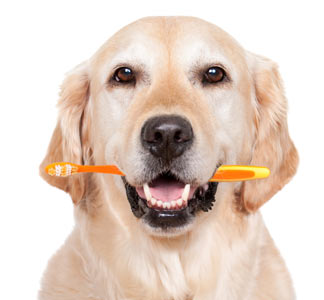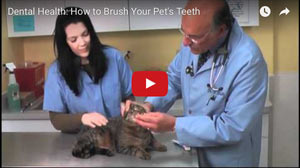Home Dental Care for Dogs

Dog teeth are the same as human teeth. They have the same structures and need the same care. If you didn't ever brush your teeth, the plaque that develops on them daily would quickly harden into tartar. Tartar is a hard coating on the teeth that allows bacteria that don't require oxygen to multiply on the surfaces of the teeth. These bacteria strains are very damaging to the teeth and gums. They cause infection, loosening of teeth, and pain.
Consequences of Poor Dental Health in Dogs
Good dental health is an important factor in your dog's overall physical condition and well-being. Painful teeth and gums can be detrimental to nutrition, general health, and quality of life. The long-term consequences of poor dental hygiene in dogs can be serious and include the possibilities below.
- Bad breath (halitosis) often accompanies dental disease. This can negatively impact your relationship with your dog. It's hard to cuddle up with a dog that has horrible breath.
- Dental abscesses (pockets of pus in the gums or teeth) are painful and often require surgery.
- Tooth loss due to periodontal disease in dogs can result in less ability to chew and poor nutrition.
- Pain from infected teeth and gums can negatively impact a dog's quality of life.
- Infections that start in the teeth and gums may become systemic, spreading through the bloodstream and causing damage to your dog's kidneys, liver, heart, or lungs.
- Repeated dental treatments, anesthesia, extractions, and oral surgeries can become expensive for you and uncomfortable or dangerous for your dog.
The good news is that, by caring for your dog's teeth on a daily basis, you can greatly reduce or even eliminate these problems.
What Supplies Are Necessary to Properly Care for Your Dog's Teeth?
First, it's always a good idea to take your dog to the veterinarian for an initial dental health assessment. Your dog may need a professional cleaning before you start a home care regimen. Your veterinarian can also advise you about your dog's dental risk factors, products you should use, and even show you how to brush your dog's teeth.
Once you get the go-ahead from your veterinarian, you can begin the job of finding products that work well for your dog. Be patient, as this process can require some trial and error. You will need:
- A dog toothbrush. There are a variety of dog toothbrushes on the market. They come in various shapes and sizes for different breeds. Look for one with an angled head and soft bristles. There are even battery-operated toothbrushes. Do not use a human toothbrush.
-
Dog toothpaste.Use dental products that are made for dogs. Do not use human toothpaste. The strong flavorings are very unappealing to dogs, and the fluoride and foaming ingredients, if swallowed, could be harmful. Many human toothpastes, including those that are labeled natural also contain the chemical xylitol. This is an artificial sweetener that is extremely toxic to dogs.
Dog toothpastes are safe to swallow (since animals don't rinse and spit) and are made in dog-friendly flavors like chicken, liver, and beef. Some toothpastes contain enzymatic agents to help loosen tartar.
- Dental treats. While not a substitute for brushing, some dental treats can help reduce the rate of tartar buildup. Give these treats to your dog as rewards and also for dental hygiene. Not all over-the-counter dental treats are created equal. Ask your veterinarian for recommendations.
How Do You Brush a Dog's Teeth?
- First, get your dog used to having your fingers around and eventually in his mouth. If this is a new experience for your dog, you may need to proceed at a very gradual pace.
- Acclimate your dog to the toothpaste and brush. Start by letting your dog lick the dog toothpaste off of your fingers. Next time, use your dog toothbrush and, again, encourage your dog to lick the toothpaste off the brush. At this point, your dog may start to look forward to this as a yummy treat, so it's not a bad idea to brush your dog's teeth around the same time every day.
-
When it's time for the real thing, position your dog in front of you—small dogs on a table, larger dogs on the floor. Restrain your dog gently so as to minimize squirming and maximize access to the mouth. Start by lifting your dog's upper lips and sliding the brush in a fine circular motion along the gum line. Focus on the front teeth first, then the back teeth if you can. Start with the upper teeth, then do the lowers. Brush the outside tooth surfaces only (if you want to keep your fingers, that is) as dogs don't build up much tartar on the inside surfaces of their teeth. As you and your dog get more comfortable, work toward reaching the upper back molars. This is usually where plaque and tartar builds up the most. The entire process should take about one minute once you and your dog get the routine down.
Some tips for dogs that become overenthusiastic at the taste of the toothpaste:
- Put your dog in a firm sit/stay position to establish calm.
- With your free hand, try gently clamping your dog's muzzle to a nearly-closed position. This will calm your dog and prevent him from trying to lick and chomp on the toothbrush (and your fingers).
- Retry the procedure with plain tap water on the brush.
- Follow every brushing session with enthusiastic praise and/or playtime, whatever your dog appreciates most, and possibly a dental treat. Reward your dog no matter how far you get into the process. Over time, this will become a habit, something that you and your dog can look forward to . . . and even smile about.
Dr. Schelling's Helpful Hints:
- Relax. If you're tense, your dog will automatically feel tense, too. If you take the process in stride, your dog may too.
- Baby steps. Introduce this routine in small increments. Your dog will appreciate you taking it slowly.
- Perfection is not required. Although daily brushing is best, any amount of brushing is better than none.
- Start now. It's never too late, although starting the tooth-brushing habit with a puppy is ideal.

You May Also Like These Articles:
Wet Food Vs. Dry Food For Dogs
Giving Your Dog Clean and Fresh Water
Disclaimer: This website is not intended to replace professional consultation, diagnosis, or treatment by a licensed veterinarian. If you require any veterinary related advice, contact your veterinarian promptly. Information at DogHealth.com is exclusively of a general reference nature. Do not disregard veterinary advice or delay treatment as a result of accessing information at this site. Just Answer is an external service not affiliated with DogHealth.com.


